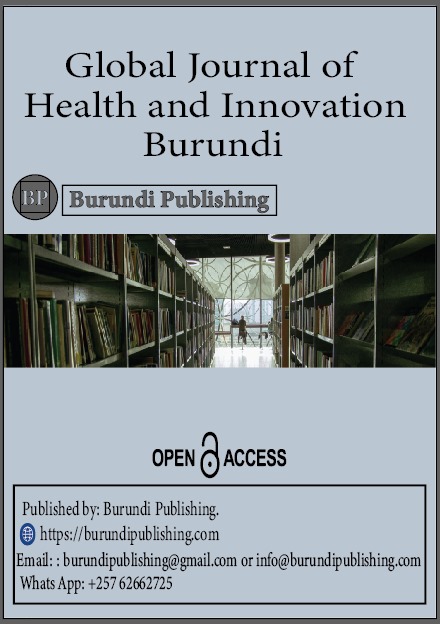IMPACT OF HOME RANGE FACTORS ON PREVENTION OF GUAINEA WORM DISEASE IN HUMANS AND ANIMALS IN LAFON AND TONJ COUNTIES, EAST SOUTH SUDAN. A CROSS-SECTIONAL STUDY.
DOI:
https://doi.org/10.70659/gjhib.v2i1.11Keywords:
Guinea worm disease, Disease prevention, Home range factors, Lafon County, East South SudanAbstract
Background.
Several factors contribute to the prevalence of GWD in Lafon and Tonj East. Key among these is the high rates of rural-urban migration, which bring diverse populations together and increase the risk of GWD transmission. This study determined the impact of home range factors on the prevention of Guainea worm disease in humans and animals in Lafon and Tonj counties, East South Sudan.
Methodology.
A descriptive study design was employed, utilizing both qualitative and quantitative research methods. Data were collected through surveys and interviews with 150 participants, including healthcare providers and residents of Lafan and Tonji Counties. Statistical analyses were conducted using regression models and correlation matrices to evaluate the relationship between the GWD prevention strategies.
Results.
117 (78%) were male participants, and the majority of participants fall within the 21-30 age group of 55(37%). A model with an R-value of 0.772 was established, indicating a strong relationship between the predictors and the ease of access to Home rang services. The R Square value was 0.878, suggesting that approximately 69.6% of the variance in accessibility to home range services can be explained by the included variables. Significant positive correlations were observed between awareness of services and perceived availability (0.64) and between the ability to afford chemical formulas and perceived availability (0.67).
Conclusion.
Home range programs significantly reduce GWD prevalence rates in Lafan and Tonji counties. The data showed that the community is highly aware of and understands home range transmission and preventive measures.
Recommendation.
Government and non-governmental organizations should support communities in implementing GWD policies and practices aimed at reducing the risk of infections and transmission among people.
References
Ernesto Ruiz-Tiben, Donald R. Hopkins TKR, and RLK. Progress Toward the Eradication of Dracunculiasis (Guinea Worm Disease). Emerg Infect Dis. Atlanta, Georgia, USA; 1995;1(2):58-60. https://doi.org/10.3201/eid0102.950205
Donald R. Hopkins MLE. Progress Toward Global Eradication of Dracunculiasis January 2012 - June 2013. Morb Mortal Wkly Rep. The Carter Center, Atlanta, Georgia.; 2013;62(42):830-3.
Ruiz-Tiben DRH and E. Dracunculiasis (guinea worm disease): a case study of the effort to eradicate guinea worm. In: Selendy JMH, editor. First. Jone Wiley and Sons, Inc.; 2011. p. 125-32. https://doi.org/10.1002/9781118148594.ch10
Amin, M. E. (2005). Social Science Research: Conception, Methodology, and Analysis. Makerere University.
Creswell, J. W. (2013). Qualitative Inquiry and Research Design: Choosing Among Five Approaches. SAGE.
Doebley, J. F., Gaut, B. S., & Smith, B. D. (2006). The molecular genetics of crop domestication. Cell, 127(7), 1309-1321. https://doi.org/10.1016/j.cell.2006.12.006
Gay, L. R., & Airasian, P. W. (2003). Educational Research: Competencies for Analysis and Applications. Merrill/Prentice Hall.
Malhotra, N. K. (2010). Marketing Research: An Applied Orientation. Pearson Education.
Molyneux, D. H., Eberhard, M. L., Cleaveland, S., Addey, R., Guiguemdé, R. T., Kumar, A., Magnussen, P., & Breman, J. G. (2020). Certifying Guinea worm eradication: Current challenges. Lancet (London, England), 396(10265), 1857-1860. https://doi.org/10.1016/S0140-6736(20)32553-8
R. Gibbs, G. (2007). Analyzing Qualitative Data. SAGE Publications, Ltd. https://doi.org/10.4135/9781849208574 https://doi.org/10.4135/9781849208574
Sekaran, U. (with Internet Archive). (2016). Research methods for business: A skill-building approach. Chichester, West Sussex, United Kingdom: John Wiley & Sons.
Downloads
Published
How to Cite
Issue
Section
License
Copyright (c) 2025 Makoy Samuel Yibi Logora, Dr. Denis Mubiru, kateregga salongo, Dr. Sendagi Mohammed

This work is licensed under a Creative Commons Attribution 4.0 International License.
License Information
All articles published in the Global Journal of Health and Innovation Burundi are licensed under the Creative Commons Attribution 4.0 International License (CC BY 4.0).
This license permits:
- Sharing: You can copy and redistribute the material in any medium or format.
- Adapting: You can remix, transform, and build upon the material for any purpose, including commercially.
Attribution Requirement: Users must provide appropriate credit to the original author(s), link to the license, and indicate if changes were made.






